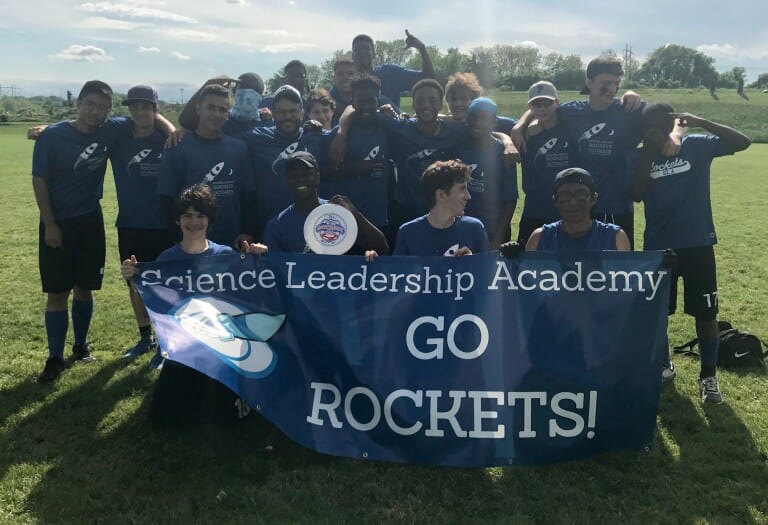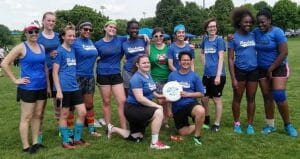Ultimate has a diversity problem.
January 12, 2018 by Guest Author in Opinion with 0 comments

This article was written by Chris Lehmann, founding principal and CEO of the Science Leadership Academy and the Science Leadership Academy Schools network, a network of three progressive science and technology schools in Philadelphia, PA. It was originally published on his blog, Practical Theory.
A version of this post has been in my draft folder for a very long time. Tonight, I was watching the WFDF U24 World Championships Men’s Semifinals, and I saw a USA roster that looked like this, and I decided that the time had come to post this and try to start a wider conversation that we’ve been having at SLA for a very long time.
***
“Why does that team cheer so loud?”
“You know… your team really gets by on their athleticism.”
“You only skied me because you’re black.”
“Tell your player to stop playing like a thug.”
“I don’t see black players and white players, I just see Ultimate players.”
I’ve heard every one of those comments directed at the Science Leadership Academy High School Boys ultimate frisbee team over the last few years. Those comments were made by parents, players, and coaches of other teams. SLA’s ultimate teams are always the most diverse teams at the tournaments we play in: over 70% of this year’s team are students of color and over 55% are African-American. And it hasn’t gone unnoticed by our players that it doesn’t always seem like we’re fully welcomed when we show up.
SLA players work hard. Our students come from all over the city of Philadelphia to a school that has no athletic facilities, so we practice at 6:30 in the morning on the only fields we can find. We have players who catch the first bus that SEPTA runs at 4:45 am to get to practice on time. And last week, we started conditioning practices – with players from our girls, boys, and JV teams coming to school at 7:00 AM every morning to sprint the halls and run the stairs for an hour before school four mornings a week. Our players deserve better than to have to play ultimate with the weight of wondering if Spirit of the Game means the same thing when your team looks like we do and almost every other team we play is overwhelmingly white.
It’s a conversation we’ve had over the years on our team – how do we deal with the intended and unintended racist behavior we face when we play. It’s not easy to be called “thug” by a white coach and then wonder why it seems that every time you make a defensive play, a foul gets called. It’s frustrating to have players on the other team lecture our team on the rules to the point where multiple players on the team take to keeping copies of the rules in their field bags. And, perhaps hardest, it’s unfair when the players on our team put up with micro-aggressive comments over and over again like having a white player from another team calling a black player on our team “young boul” during a heated argument and then get told, “Well, your team makes comments too…” when SLA players finally get angry and get tired of playing against what feels like an eighth player on the field – the institutional racism we still feel in the game we love.

In short, I think we have a race problem in our sport. And I’m concerned that it’s more serious than many ultimate players want to admit.
I do believe that this can be changed if ultimate decides that social justice and equity is part of the fabric of the sport. We are seeing really important, powerful conversations happen within the ultimate world around gender equity because of the work of dedicated activists who are demanding that we do better. We need a similar conversation – a similar movement – to address the persistent lack of diversity, especially affecting traditionally under-served populations, in our sport.
It will require us as a community to really examine some of the more subtle ways we act, because many of the problems are on the level of micro-aggressions committed by people who would never consider themselves racist in any way. And it will require us to be deliberate in our actions if we want our sport to look more the world in which we live.
This won’t necessarily be easy. Ultimate players like to think of themselves as a generally left-leaning, socially progressive group of people, and, yet, the sport has remained stubbornly white: we need to ask ourselves why. So as we cheer on the U24 USA teams at WFDF, and as high school and college teams start to prepare for their spring seasons, perhaps we can start to ask ourselves some hard questions. I ask that we ask these questions with an open mind and with the lens that we all love Ultimate and that there is a growing movement of players who want our sport only to be a better, more inclusive community tomorrow than it is today:
- What is there structurally about ultimate in the US that keeps it from becoming a more diverse sport?
- What institutional biases from the rest of our country and our world work their way into ultimate that we could deliberately unpack and address?
- How can my actions as a player / coach / spectator / fan of ultimate create a more inclusive atmosphere for all players?
- Are we committed to seeing ultimate become a sport that looks more like our country and our world?
- How can our institutions (USA Ultimate, the AUDL, local leagues) do more to break down barriers to entry and create more opportunities for athletes of color to take part in the world of ultimate? (And to that end, programs like USAU’s Play It Forward and DISCNW‘s youth development in Seattle are very good starts, but they are only a start.)
I think it’s time, as a community – as a sport – to ask ourselves these hard questions. I believe they can lead us somewhere good. Maybe our answers can inform our policies around youth development. Maybe it informs the way teams and players act every day. Maybe it simply creates the space for us to consider questions that, in many ways, are long overdue for us to ask.
I’ve spent twenty years coaching ultimate – first in NYC and now in Philly – where our teams were always the most diverse teams wherever we played. And in too many spaces and too many tournaments, we’ve been the only diverse team. It’s time for that to end, and it’s going to take all of us to make that happen.